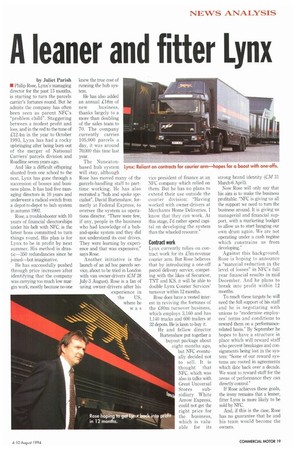A leaner and fitter Lynx
Page 21

If you've noticed an error in this article please click here to report it so we can fix it.
by Juliet Parish • Philip Rose, Lynx's managing director for the past 15 months, is starting to turn the parcels carrier's fortunes round. But he admits the company has often been seen as parent NFC's "problem child". Staggering between a modest profit and loss, and in the red to the tune of £12.4m in the year to October 1993, Lynx has had a rocky upbringing after being born out of the merger of National Carriers' parcels division and Roadline seven years ago.
And like a difficult offspring shunted from one school to the next, Lynx has gone through a succession of bosses and business plans. It has had five managing directors in 10 years and underwent a radical switch from a depot-to-depot to hub system in autumn 1992.
Rose, a troubleshooter with 10 years of financial directorships under his belt with NFC, is the latest boss committed to turn things round. His plan is for Lynx to be in profit by next summer. His method is drastic-350 redundancies since he joined—but imaginative.
He has successfully pushed through price increases after identifying that the company was carrying too much low margin work, mostly because no one knew the true cost of running the hub system.
He has also added an annual £18m of
new business, thanks largely to a more than doubling of the sales team to 70. The company currently carries 105,000 parcels a day, it was around 70,000 this time last year.
The Nuneatonbased hub system Lynx: Reliant on contracts for courier arm—hopes for a boost with one-offs. will stay, although Rose has moved many of the parcels-handling staff to parttime working. He has also recruited a "hub and spoke specialist", David Burtenshaw, formerly at Federal Express, to oversee the system as operations director. "There were few, if any, people in the business who had knowledge of a huband-spoke system and they did not understand its cost drives. They were learning by experience and that was expensive," says Rose.
Another initiative is the launch of an ad hoc parcels service, about to be tried in London with van owner-drivers (CM 28 July-3 August). Rose is a fan of using owner-drivers after hit-. experience in the US, where he w a s vice president of finance at an NFC company which relied on them. But he has no plans to extend their use outside the courier division: "Having worked with owner-drivers at Merchants Home Deliveries, I know that they can work. At this stage, I'd rather spend capital on developing the system than the wheeled resource."
Contract work Lynx currently relies on contract work for its £5m-revenue courier arm. But Rose believes that by introducing a one-off parcel delivery service, competing with the likes of Securicor, TNT and ICS, it will be able to double Lynx Courier Services' turnover within 12 months.
Rose does have a vested interest in reviving the fortunes of the £80m turnover business, which employs 3,160 and has 1,140 trucks and 600 trailers at 32 depots. He is keen to buy it. He and fellow director Burtenshaw put together a buyout package about eight months ago, but NFC eventually decided not to sell. It is thought that NFC, which was also in talks with Great Universal
Stores subsidiary White Arrow Express, could not get the right price for the business, which is valuable for its
strong brand identity (CM 31 March-6 April).
Now Rose will only say that his aim is to make the business profitable: "NFC is giving us all the support we need to turn the business around. It is giving us managerial and financial support, with a marketing budget to allow us to start banging our own drum again. We are not operating under a cash regime which constrains us from developing."
Against this background, Rose is hoping to announce a "material reduction in the level of losses" in NFC's full year financial results in mid December. And he plans to break into profit within 12 months.
To reach these targets he will need the full support of his staff and he is negotiating with unions to "modernise employees' terms and conditions to reward them on a performancerelated basis." By September he hopes to have a structure in place which will reward staff who prevent breakages and consignments being lost in the system: "Some of our reward systems are rooted in agreements which date back over a decade. We want to reward staff for the areas of performance they can directly control."
If Rose achieves these goals, the irony remains that a leaner, fitter Lynx is more likely to be sold by NFC.
And, if this is the case, Rose has no guarantee that he and his team would become the owners.






















































































